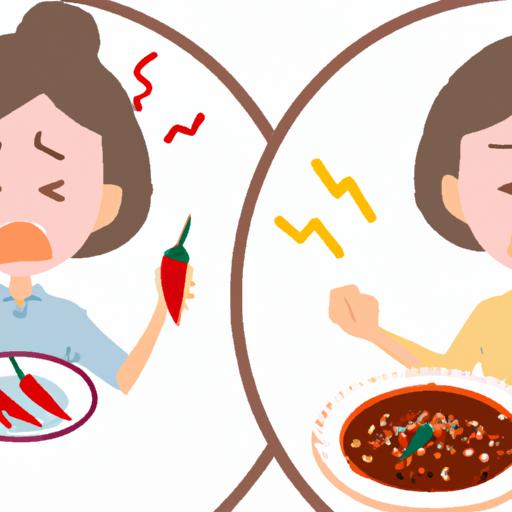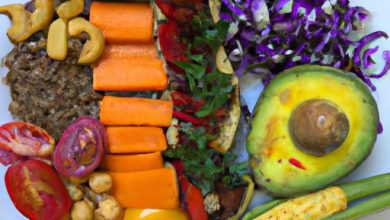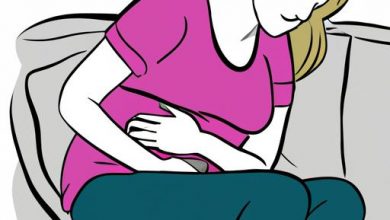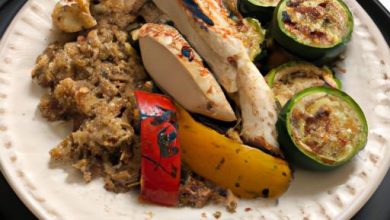What is Bland Food Diet? A Comprehensive Guide
Are you experiencing digestive issues, such as nausea, vomiting, or heartburn? Or maybe you’ve recently undergone surgery, radiation therapy, or chemotherapy, and you’re looking for a diet that’s gentle on your body. If that’s the case, you may have heard of the bland food diet.
Definition of Bland Food Diet

As the name suggests, the bland food diet is a low-fat, low-fiber, and low-spice diet that aims to reduce irritation and inflammation in the digestive tract. The diet typically includes foods that are easy to digest, such as whole grains, lean proteins, fruits, and vegetables, while avoiding spicy, fatty, acidic, and high-fiber foods.
Its Purpose and Benefits
The main purpose of the bland food diet is to provide relief from digestive discomfort by minimizing irritation and inflammation in the digestive tract. The diet is often recommended for people with gastrointestinal disorders, such as gastritis, peptic ulcer disease, irritable bowel syndrome, and Crohn’s disease.
When followed correctly, the bland food diet can offer several benefits, such as:
- Reducing nausea, vomiting, and heartburn
- Relieving abdominal pain and cramping
- Improving bowel movements
- Promoting healing of the digestive tract
- Increasing nutrient absorption
- Supporting weight loss
Now that we have a basic understanding of what the bland food diet is let’s dive into the foods you should include and avoid in this diet.
The bland food diet is all about choosing foods that are easy to digest and avoiding those that may irritate the digestive tract. Here are some foods you should include and avoid in the bland food diet.
Foods to Include
Whole Grains and Cereals
Whole grains and cereals are excellent sources of fiber, vitamins, and minerals. However, some grains, such as wheat and rye, may be difficult to digest for some people. Here are some whole grains and cereals that are easy to digest:
- White rice
- Oatmeal
- Cream of wheat
- Barley
- Cornmeal
- Saltine crackers
Lean Proteins
Protein is essential for building and repairing tissues in the body. However, some protein sources, such as fatty meats, can be difficult to digest. Here are some lean protein sources that are easy to digest:
- Skinless chicken
- Turkey
- Fish
- Tofu
- Eggs
Fruits and Vegetables
Fruits and vegetables are excellent sources of fiber, vitamins, and minerals. However, some fruits and vegetables, such as citrus fruits and tomatoes, may be too acidic for some people. Here are some fruits and vegetables that are easy to digest:
- Bananas
- Applesauce
- Cooked carrots
- Cooked green beans
- Canned fruits without added sugar
Low-fat Dairy Products
Dairy products are excellent sources of calcium, which is essential for bone health. However, some dairy products, such as whole milk and cheese, may be high in fat and difficult to digest. Here are some low-fat dairy products that are easy to digest:
- Skim milk
- Low-fat yogurt
- Cottage cheese
Foods to Avoid
Spicy and Fatty Foods
Spicy and fatty foods can irritate the digestive tract and cause heartburn, nausea, and vomiting. Here are some spicy and fatty foods to avoid:
- Spicy foods, such as hot peppers and curry
- Fried foods, such as French fries and fried chicken
- Fatty meats, such as bacon and sausage
- Creamy sauces and dressings, such as Alfredo sauce and ranch dressing
Citrus Fruits and Juices
Citrus fruits and juices are high in acid, which can irritate the digestive tract and cause heartburn and acid reflux. Here are some citrus fruits and juices to avoid:
- Oranges
- Grapefruits
- Lemons
- Limes
- Pineapple
Tomato-based Products
Tomatoes are high in acid, which can irritate the digestive tract and cause heartburn and acid reflux. Here are some tomato-based products to avoid:
- Tomato sauce
- Ketchup
- Salsa
- Marinara sauce
Alcohol and Caffeine
Alcohol and caffeine can irritate the digestive tract and cause heartburn, nausea, and vomiting. Here are some alcoholic and caffeinated beverages to avoid:
- Beer
- Wine
- Coffee
- Tea
- Soda
Now that you know which foods to include and avoid in the bland food diet, let’s discuss some health conditions that may require this diet.
Foods to Avoid in a Bland Food Diet
The bland food diet aims to reduce irritation and inflammation in the digestive tract by avoiding foods that are difficult to digest or that can irritate the digestive system. Here are some foods you should avoid while following a bland food diet.
Spicy and Fatty Foods
Spicy and fatty foods can irritate the digestive tract and cause heartburn, nausea, and vomiting. These foods can also increase the risk of developing acid reflux and other gastrointestinal disorders. Examples of spicy and fatty foods to avoid include:
- Hot peppers
- Curry
- Fried foods
- Fatty meats, such as bacon and sausage
- Creamy sauces and dressings, such as Alfredo sauce and ranch dressing
Citrus Fruits and Juices
Citrus fruits and juices are high in acid, which can irritate the digestive tract and cause heartburn and acid reflux. These foods can also increase the risk of developing gastritis and peptic ulcer disease. Examples of citrus fruits and juices to avoid include:
- Oranges
- Grapefruits
- Lemons
- Limes
- Pineapple
Tomato-based Products
Tomatoes are high in acid, which can irritate the digestive tract and cause heartburn and acid reflux. These foods can also increase the risk of developing gastritis and peptic ulcer disease. Examples of tomato-based products to avoid include:
- Tomato sauce
- Ketchup
- Salsa
- Marinara sauce
Alcohol and Caffeine
Alcohol and caffeine can irritate the digestive tract and cause heartburn, nausea, and vomiting. These beverages can also increase the risk of developing gastritis, peptic ulcer disease, and acid reflux. Examples of alcoholic and caffeinated beverages to avoid include:
- Beer
- Wine
- Coffee
- Tea
- Soda
Now that we have discussed the foods to avoid, let’s talk about the health conditions that may require a bland food diet.
Health Conditions that May Require a Bland Food Diet
The bland food diet is often recommended for people with gastrointestinal disorders, surgery recovery, and chemotherapy or radiation therapy. Here are some of the health conditions that may require a bland food diet.
Gastrointestinal Disorders
Gastrointestinal disorders, such as gastritis, peptic ulcer disease, irritable bowel syndrome, and Crohn’s disease, can cause inflammation and irritation in the digestive tract. The bland food diet can help reduce these symptoms by minimizing irritation and inflammation in the digestive tract.
Surgery Recovery
After surgery, the digestive system may be temporarily weakened, making it difficult to digest certain foods. The bland food diet can provide the body with easy-to-digest foods that do not irritate the digestive system and promote healing.
Chemotherapy and Radiation Therapy
Chemotherapy and radiation therapy can cause nausea, vomiting, and diarrhea, making it difficult to eat and digest food. The bland food diet can provide the body with easy-to-digest foods that do not irritate the digestive system and help reduce these symptoms.
In conclusion, the bland food diet is a low-fat, low-fiber, and low-spice diet that aims to reduce irritation and inflammation in the digestive tract. The diet includes foods that are easy to digest, such as whole grains, lean proteins, fruits, and vegetables, while avoiding spicy, fatty, acidic, and high-fiber foods. This diet can offer several benefits, such as reducing nausea, vomiting, and heartburn, relieving abdominal pain and cramping, improving bowel movements, promoting healing of the digestive tract, increasing nutrient absorption, and supporting weight loss. If you have a gastrointestinal disorder, are recovering from surgery, or undergoing chemotherapy or radiation therapy, talk to your healthcare provider to see if the bland food diet is right for you.
Sample Bland Food Diet Plan
Now that we know which foods to include and avoid in the bland food diet, let’s discuss some sample meal ideas.
Breakfast Options
- Oatmeal with sliced banana and skim milk
- Scrambled eggs with whole wheat toast
- Low-fat yogurt with sliced peaches and a sprinkle of granola
Lunch Options
- Grilled chicken breast with steamed rice and cooked carrots
- Tuna salad made with low-fat mayonnaise on whole wheat bread
- Vegetable soup with a side of saltine crackers
Dinner Options
- Baked fish with steamed broccoli and white rice
- Turkey meatballs with tomato sauce over whole wheat pasta
- Stir-fried tofu with mixed vegetables and brown rice
Snack Ideas
- Rice cakes with low-fat cream cheese and sliced cucumber
- Apple slices with a tablespoon of almond butter
- Low-fat string cheese with whole wheat crackers
Remember to choose foods that are easy to digest and avoid those that may cause discomfort. Also, be sure to drink plenty of water throughout the day to stay hydrated.
Conclusion
In conclusion, the bland food diet is a low-fat, low-fiber, and low-spice diet that aims to reduce irritation and inflammation in the digestive tract. This diet may be helpful for people with gastrointestinal disorders, such as gastritis, peptic ulcer disease, irritable bowel syndrome, and Crohn’s disease, as well as those recovering from surgery, radiation therapy, or chemotherapy.
By following the bland food diet, you can reduce symptoms of digestive discomfort, promote healing of the digestive tract, and increase nutrient absorption. However, it’s important to consult with a healthcare provider before starting this diet to ensure it’s safe and appropriate for your individual needs.
At Zahnweiss Info, we’re committed to providing the latest updates on dental health news, treatments and therapies, inspiring patient stories, and expert advice. If you have any questions or concerns about the bland food diet, be sure to speak with your healthcare provider or a registered dietitian for personalized guidance.



